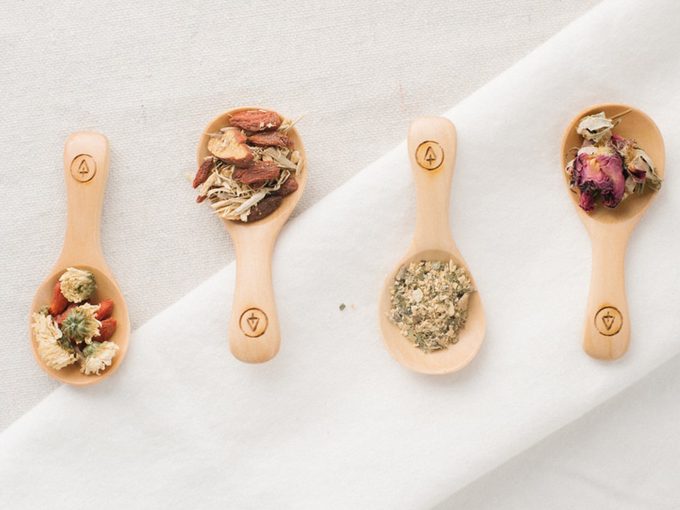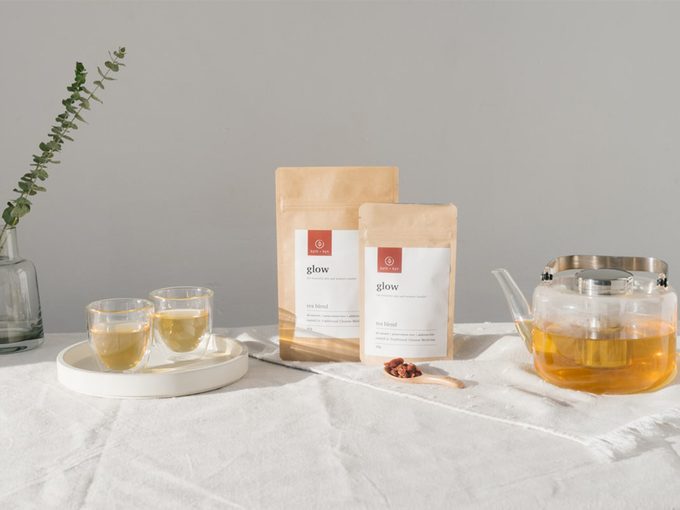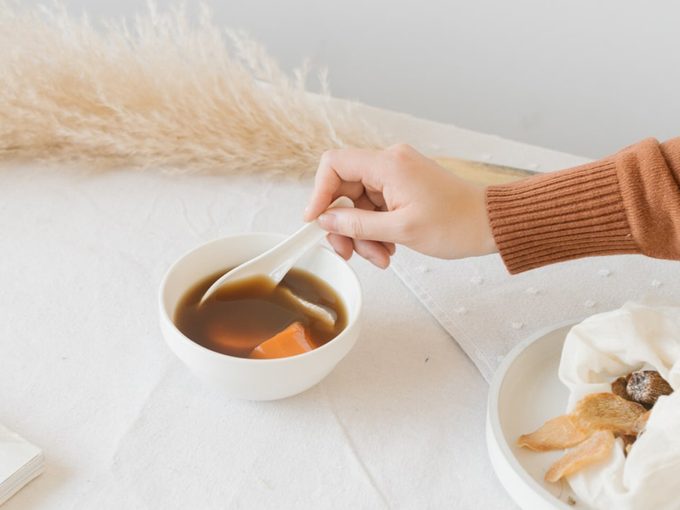Sharing Chinese Herbal Soups and Teas, Steeped in Tradition

“I developed kyth + kyn for people to learn more about Chinese culture and be proud of it,” says Vancouver-based founder Vivian Man.
Vivian Man grew up in Hong Kong and in her home, Chinese broths, herbal soups and dessert soups were frequently on the menu. The recipes, often made by her mother or grandparents, changed with the seasons. In the summer, aunties came over with bottles of chrysanthemum tea with goji berries, ingredients for cooling teas that help combat internal heat. In the winter months, there would be ginseng and warming herbs, mixes to help boost the immune system.
Man’s family moved from Hong Kong to Canada when she was seven and eventually she began learning to make her mom’s healing soups at their home in Vancouver. These herbal recipes played a huge role in Man’s family’s health and wellbeing, and as she grew older, Man thought about how she could better preserve and share these traditions. “I don’t want my generation and generations after mine to lose touch with our roots and culture,” she says.
So, she began studying holistic nutrition and in 2017, she left a career in marketing to become a holistic nutritionist. A year later, Man opened kyth + kyn, her modern take on traditional Chinese herb shops. The Vancouver-based online shop sells Chinese wellness products, which include herbal soups and teas—including some recipes that were staples in Man’s family kitchen.
Here, Man shares with us her own personal history with Chinese herbs and explains how kyth + kyn honours traditional Chinese medicine while educating people of all backgrounds about its healing properties.
Before starting your business, what was your experience with traditional Chinese medicine?
Throughout my childhood, I’ve gone to traditional Chinese medicine doctors. They would usually be in the back room of the Chinese herbal shop. They’d take my pulse, look at my tongue and would ask how I was feeling. The doctor would write down their recommended herbs on a sheet of paper. We’d take it to the herbalist at the front of the shop and they’d grab all the herbs, put them in paper sheets and wrap them up for you to take home and boil into soups or teas. They were usually these black concoctions that did not taste good. You’d have to just plug your nose and try to drink it all because your parents said it’s good for you. But you don’t really know what’s in it or what it’s for.

How did your relationship with Chinese herbs change with time?
As I got older, my mom would try her best to educate me on what the ingredients were, what they did and how to make her soups. But I took it for granted because I always thought she’d be around to make it for me. In 2015, my parents moved back to Hong Kong. I missed my mom’s delicious broths, but I had no clue how to make them. I’d FaceTime her and she’d tell me what to do. But it was very informal. There was no real recipe. She’d just eyeball all the quantities. That’s when I realized that all of this is in our elders’ heads. It’s not written down or shared anywhere. That’s why I started kyth + kyn—to preserve these recipes and this culture.
Tell me about the products at kyth + kyn and how you developed them.
I have a cousin who is a traditional Chinese medicine doctor in Hong Kong. He was my first point of contact. He would educate me and make sure what I wanted to put in the Chinese herbal teas and soups would do what I said they would do. As my product line expanded, I reached out to traditional Chinese medicine doctors here in Vancouver. I’ve also studied holistic nutrition, so that helped to understand what issues people were facing with their health.
While I do have an herbal soup blend, I find they’re more foreign for Westerners, especially dessert soups. So I’ve focused on tea blends because they’re accessible. One of our bestsellers is the digest herbal tea blend which helps support digestion after heavy meals. It has peppermint, ginger root and dried tangerine peel. Our glow tea is also popular and it’s very traditional in Asian households. It’s got goji berries and Chinese red dates which are good for skin health and women’s health. It increases blood circulation. Moms would give this to their daughters after having their period to replenish blood and recoup for the next cycle.

(Related: 8 herbal teas you can grow in your garden)
Who did you develop these products for?
I had Westerners in mind, but also people like myself who have grown up or were born in the West, know a little bit about herbs from family and are curious about it, but don’t fully understand how to use it.
I developed kyth + kyn for people to learn more about Chinese culture and be proud of it—that it can be modern and cool. People similar to myself, who have grown up in Canada, say they appreciate that there’s a brand out there that represents our culture and is looking to preserve it in a way that is accessible and easy to understand. It feels very nostalgic for them. But they can also drink this with their friends and tell them about it. Westerners tell me that they didn’t know they could add Chinese herbs to soups. I have older clients buy ten packs of my soup blends at events or markets because they didn’t know when I’d be back and they don’t really know how to use the internet. It’s nice that different backgrounds and age brackets are interested in it.
Are there any misconceptions about Chinese herbal soups, teas or traditional medicine?
There’s a misconception that it has to taste like medicine—that they’re all really dark, black concoctions that do not taste good. But Chinese herbs can be used every day in teas and soups. It can be used as food. Also, and it’s not just with Chinese medicine but with all alternative medicine, alternative ways to wellness can be seen as inferior to conventional medicine. But I think, nowadays, we’re really making a good shift towards acceptance of holistic health and trying alternative medicine.
(Related: This Soap Brand Is Sharing the Healing Power of Inuit Tradition)
How would you feel if you came across a white-owned company that was doing something similar to what you were doing?
I’ve thought about that a lot recently because of [the Mahjong Line, a group of three white women in Texas that thought the traditional Chinese game of Mahjong needed a “design refresh”]. They wanted to improve the game of Mahjong. There’s also a Western woman who wanted to elevate or modernize Chinese congee. She was putting cinnamon and blueberries in it, as if it was oatmeal.
There’s a spectrum. People may think that they’re trying to adopt our culture as best as they understand it. But it depends on how they honour our traditions. A Westerner who feels strongly about Chinese herbs, pays homage to the history behind it and really wants to educate would be different from someone that thinks what they’re doing is elevated or better than what’s already out there. That really gets to me.

(Related: How to Be an Ally to the Asian Canadian Community)
How does kyth + kyn honour your Chinese heritage?
Having grown up here, I really wanted to fit in with the Western culture. So I definitely brushed off as much of my Chinese culture as I could. It wasn’t ‘cool’ to be drinking Chinese herbal teas and soups. But now that I’m older, I’m thinking ahead to when I have kids and what it is that I want to leave behind for them. If I don’t preserve these traditions for the next generation, it will be lost, and it would be a shame because these traditions date back centuries. Chinese herbs are one way for me, through kyth + kyn, to really hold on to that culture and share it with everyone.
This story is part of Best Health’s Preservation series, which spotlights wellness businesses and practices rooted in culture, community and history. Read more from this series here:
This Soap Brand Is Sharing the Healing Power of Inuit Tradition
This Canadian Soap Brand is Rooted in Korean Bathhouse Culture
Meet Sisters Sage, an Indigenous Wellness Brand Reclaiming Smudging
Get more great stories delivered straight to your inbox by signing up for the Best Health Must-Reads newsletter. Subscribe here.




